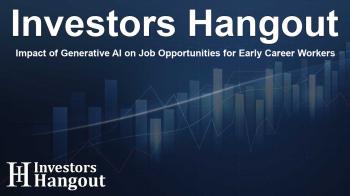Impact of Generative AI on Job Opportunities for Early Career Workers

Generative AI and its Influence on Employment
Generative AI is revolutionizing various sectors, but its effects on early-career job seekers are concerning. Recent findings indicate that younger individuals in AI-exposed fields are facing notable declines in job opportunities, while older workers remain largely unaffected. This shift emphasizes the significant impact of automation and AI advancements on the labor market.
Studying the Impact on Early-Career Workers
The research highlights a staggering 13% decline in hiring among early-career professionals aged 22 to 25. This decline is particularly noticeable in sectors like software engineering, where AI capabilities are rapidly advancing. Insights from 2023 reveal that AI could address only 4.4% of issues in software engineering tasks, but by the following year, this number skyrocketed to 71.7%. Such improvements indicate a growing dependency on AI technologies in the workplace.
Understanding the Study
This study primarily utilized payroll data from reliable sources to track individual hiring changes. It notes that the most severe employment impacts began around late 2022, a period coinciding with the increased adoption of AI tools across various industries.
Human vs. AI: The Employment Balance
Interestingly, while generative AI is reshaping job landscapes, its effects vary significantly by the nature of work involved. The study underscores that job functions primarily subjected to automation face the greatest risks. Conversely, positions where AI serves as a supportive tool for human workers are less likely to be adversely affected.
Industry-wide Observations
The decline in job prospects for younger workers is not isolated to specific industries or companies. Conventional economic factors, such as interest rate fluctuations, didn’t appear to contribute to this trend. This broad impact of generative AI signals a fundamental change in hiring dynamics that necessitates attention from policymakers and educational institutions alike.
The Need for Workforce Adaptation
As the study illuminates the shifting employment landscape, it serves as a critical indicator for stakeholders involved in workforce planning and educational reform. Addressing these changes promptly may help mitigate adverse outcomes for future job seekers.
Planning for Future Workforce Dynamics
The implications of generative AI on hiring trends present a potential harbinger for young job seekers. With AI technologies evolving at a rapid pace, the traditional paths into many professions may no longer suffice. Suppliers of educational programs and policymakers must take note; tailoring curricula and resources to equip upcoming generations with relevant skills will be essential for navigating this new era of employment.
Frequently Asked Questions
What is the main finding of the Stanford study?
The study reveals a 13% decline in hiring for early-career workers aged 22-25 in AI-exposed fields, particularly affecting jobs like software engineering.
How does generative AI impact employment trends?
Generative AI improves efficiency in processes, drastically reducing the need for human intervention in many tasks, leading to decreased job opportunities for young workers.
Are older workers affected by these trends?
No, older workers in less AI-exposed roles generally remain unaffected, with many even witnessing increased job opportunities.
What should educational institutions do in response?
Educational bodies should adapt their curricula to include skill sets relevant to new technologies, ensuring students are equipped for future job markets.
What is the outlook for young job seekers?
The outlook is challenging; young workers must develop technical skills and adaptability to thrive in a job market increasingly influenced by AI technologies.
About The Author
Contact Thomas Cooper privately here. Or send an email with ATTN: Thomas Cooper as the subject to contact@investorshangout.com.
About Investors Hangout
Investors Hangout is a leading online stock forum for financial discussion and learning, offering a wide range of free tools and resources. It draws in traders of all levels, who exchange market knowledge, investigate trading tactics, and keep an eye on industry developments in real time. Featuring financial articles, stock message boards, quotes, charts, company profiles, and live news updates. Through cooperative learning and a wealth of informational resources, it helps users from novices creating their first portfolios to experts honing their techniques. Join Investors Hangout today: https://investorshangout.com/
The content of this article is based on factual, publicly available information and does not represent legal, financial, or investment advice. Investors Hangout does not offer financial advice, and the author is not a licensed financial advisor. Consult a qualified advisor before making any financial or investment decisions based on this article. This article should not be considered advice to purchase, sell, or hold any securities or other investments. If any of the material provided here is inaccurate, please contact us for corrections.

